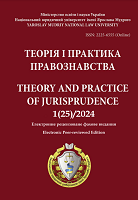Civic Entrepreneurs and "Ratio Legis" During Russia’s War in Ukraine: a Case Study of Digital Petitions in Latvia and Ukraine
Civic Entrepreneurs and "Ratio Legis" During Russia’s War in Ukraine: a Case Study of Digital Petitions in Latvia and Ukraine
Author(s): Dmytro V. Luchenko, Didzis MelkisSubject(s): Public Administration, ICT Information and Communications Technologies, Administrative Law, Russian Aggression against Ukraine
Published by: Національний юридичний університет імені Ярослава Мудрого
Keywords: policy entrepreneurs; civic entrepreneurs; electronic petitions; public initiatives; e-participation in legislation; ManaBalss.lv; ratio legis; war in Ukraine;
Summary/Abstract: Civic initiatives that manifest themselves in the legitimate form of electronic petitions (initiatives) in different countries of the world are attracting more and more attention. This is especially true in times of social crisis. The war in Ukraine has become one of the most powerful factors influencing civic activity in both Ukraine and Latvia. A significant number of civic initiatives have emerged as a result of the war. The very content and focus of this activity has changed significantly under the influence of wartime challenges, which requires a separate scientific analysis. These circumstances have actualised the authors’ research in this area. This article is the first attempt to study the experience of Latvia and Ukraine in the field of electronic petitions in the context of the war in Ukraine. The purpose of the article is to examine the role and influence of civil society actors on the justification of legislation, or ratio legis, in the legislative processes of Latvia and Ukraine during the crisis caused by the Russian war in Ukraine. To achieve this goal and solve the tasks stipulated by it, the following scientific methods were used: systematic, formal legal, comparative legal, analysis and synthesis, generalisation and critical analysis. The authors have studied Ukrainian and Latvian legislation defining the procedures for publishing electronic petitions and collecting signatures in their support. The analysis shows that during the first two years of the war in Ukraine, the public initiative platform ManaBalss.lv (MyVoice) in Latvia received 165 proposals on wartime issues. Of these, 49 initiatives were published that met ManaBalss. lv’s quality criteria. Among them, 10 reached the legally required threshold of signatures and were submitted to the parliament (Saeima) or the respective municipalities as collective submissions. Two of these collective submissions were implemented, in particular, an amendment to the legislation legally obliging employees of state institutions to be loyal to the Republic of Latvia and its Constitution was introduced. The study also examines the history of the 2019 collective submission to the Saeima demanding the demolition of the grandiose Soviet-era Victory Monument, which is protected by an international agreement. The study also includes the Ukrainian experience of civic activism, such as the initiative to legalise same-sex civil unions. It has acquired a new vector of relevance due to the war in Ukraine. This initiative was aimed at creating legal grounds for informing de facto spouses about the injury, captivity or death of the other partner, as well as exercising rights related to the death of a partner. The study revealed the targeted, persistent influence of individual and organised public figures or social entrepreneurs on the current state of legislation in the areas that have proven to be most sensitive to the challenges of war. The study of synergies, especially between civic and political entrepreneurs, aims to improve understanding of the mutually constructive work of policymakers and strengthen democracy. A properly conceptualised and practical experiencebased mechanism of digital civic participation contributes to achieving this goal. This area is promising for further research.
Journal: Теорія і практика правознавства
- Issue Year: 1/2024
- Issue No: 25
- Page Range: 6-34
- Page Count: 29
- Language: English

